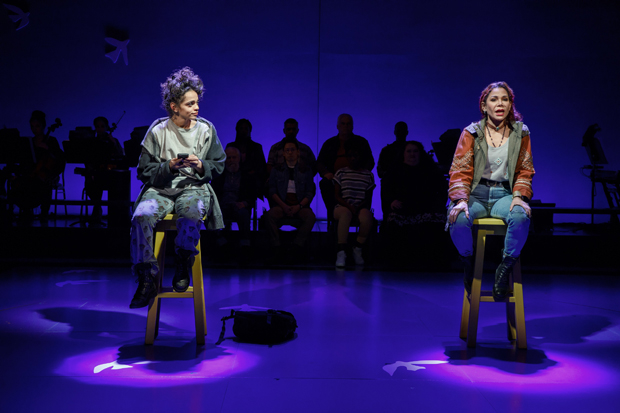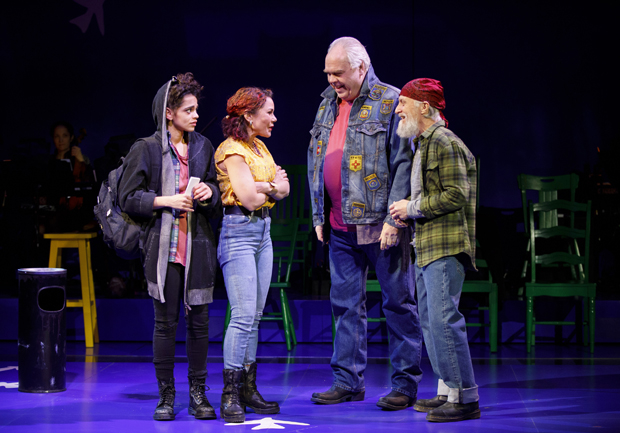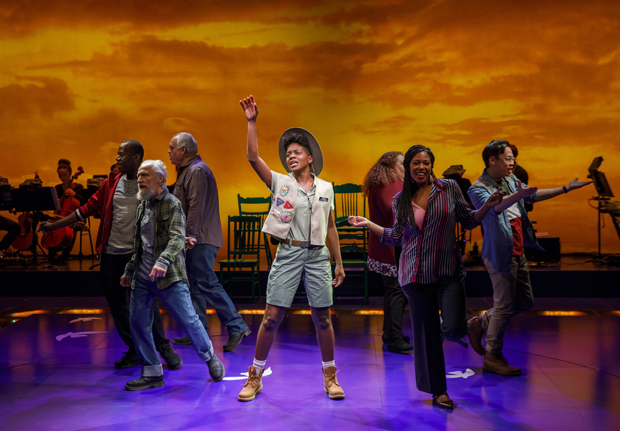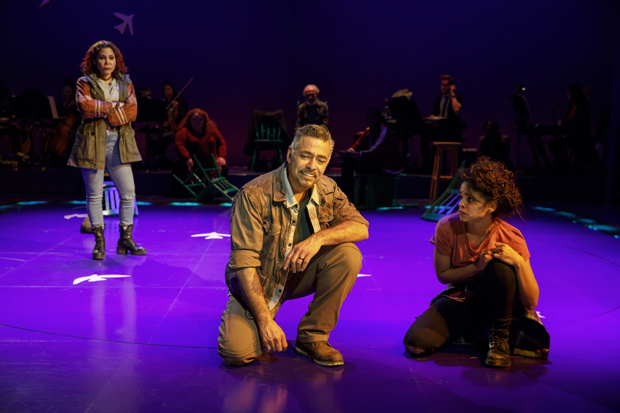Miss You Like Hell Is a Musical About Living Undocumented in America

(© Joan Marcus)
In 2017, Immigration and Customs Enforcement deported 226,119 people from the United States. Of those, 81,603 were "interior removals," meaning people who were already living in the United States, sometimes for a significant period of time. Having spent most of her adult life in the United States, undocumented Mexican immigrant Beatriz would qualify as one of those interior removals. She's one of the twin heroines (the other being her 16-year-old American daughter, Olivia) of Miss You Like Hell, the new musical by Pulitzer Prize winner Quiara Alegría Hudes (book) and folk-rocker Erin McKeown (score), now playing at the Public Theater. Hudes and McKeown admirably attempt to put a human face on cold statistics, but they are too often thwarted by a lack of faith in their central story.
Beatriz (Daphne Rubin-Vega) and Olivia (Gizel Jiménez) are estranged at the top of the show, but Beatriz has driven from California to Philadelphia (where Olivia lives with her father) after reading a suicidal post on Olivia's blog. This is a dangerous mission since Beatriz has no valid driver's license and her truck is registered in her neighbor's name. Making matters worse, Beatriz is facing deportation due to a 16-year-old conviction for marijuana possession in South Dakota. Beatriz hopes to save her daughter's life by convincing her to leave home in the dead of night (and without dad's consent) for a cross-country road trip. If the trip happens to take them through South Dakota and a judge vacates her conviction, that's gravy. Of course, this whole adventure might just end up adding "kidnapping a minor" to Beatriz's rap sheet.

(© Joan Marcus)
The story of a mother and daughter reconciling on the road is a powerful one, especially when they are staring down a lifetime of forced separation. Ill-advisedly, Hudes and McKeown hedge their bets with additional plot lines: Beatriz and Olivia meet Mo (Michael Mulheren) and Higgins (David Patrick Kelly), an elderly same-sex couple who are riding their Harleys through all 50 states. They invite Olivia and Beatriz to perform their nuptials. If that impromptu gay wedding isn't enough to make you cry, there's Manuel (Danny Bolero): His wife died of cancer, but he honors her memory by selling her tamales out of a cart. One hundred minutes of such cloying and carefully calibrated emotional manipulation will exhaust even the most stalwart bleeding heart.
McKeown's eclectic folk-rock-country-Tejano-R&B score energizes things somewhat, but good luck recalling any of the tunes. The lyrics are more memorable, if only for their inelegance: A heartfelt duet between Olivia and an obsessive online commenter (Latoya Edwards) overflows with pretentious descriptors like "sad conquistador," ending with the oddly passive declaration, "You will be received."

(© Joan Marcus)
Admittedly, a little bit of affectation feels right for Olivia, a literary-minded loner whose closest friends exist in the digital sphere. The big-voiced Jiménez plays her with cockeyed angst, oscillating between gleeful discovery and irate martyrdom in a manner that feels authentically teenaged. Rubin-Vega is similarly excellent at inhabiting Beatriz with specificity and emotional stakes. Through their performances, we can easily see the line from artsy, free-spirited mom to bookish, sensitive daughter.
Unfortunately, they are not helped by director Lear deBessonet, who falls into the trap of delivering a workshop production in lieu of a full one. Onstage audience seating creates a thrust space, with the band and ensemble seated upstage. Riccardo Hernandez's uncluttered set features an extravagantly underutilized rotating stage, while Tyler Micoleau's lighting at least keeps apace with the strange tonal shifts in the script. Emilio Sosa's casual costumes and Jessica Paz's adequate sound design complete a serviceable production that would dazzle in a rehearsal room, but leaves us bored in the Newman Theater.
This is also true of Danny Mefford's generic choreography, which leans heavily on emotionally pointed crosses and hands gestures: During the song "Bibliography," Olivia and the cast inexplicably perform the manual alphabet backward while listing corresponding book titles (X is for The Autobiography of Malcolm X, P is for A People's History of the United States). Frustratingly, it often feels like Miss You Like Hell is more interested in broadcasting its woke intersectional bona fides than actually telling the story at hand.

(© Joan Marcus)
This represents a lost opportunity considering the number of families currently struggling through an ossified, unreasonable immigration system. Their stories absolutely belong onstage. The fact that Olivia documents everything for an anonymous online audience seems to open the door for a story about our increasingly oppressive surveillance culture (a condition greatly aided by our own exhibitionism). How can Olivia be sure ICE isn't reading her Tumblr? Sadly, the creative team behind Miss You Like Hell misses that opening too, opting instead for feel-bad-to-feel-righteous schmaltz conveyed through forgettable songs. At just one act, it's not hell to sit through, but you certainly won't miss it once it's gone.










